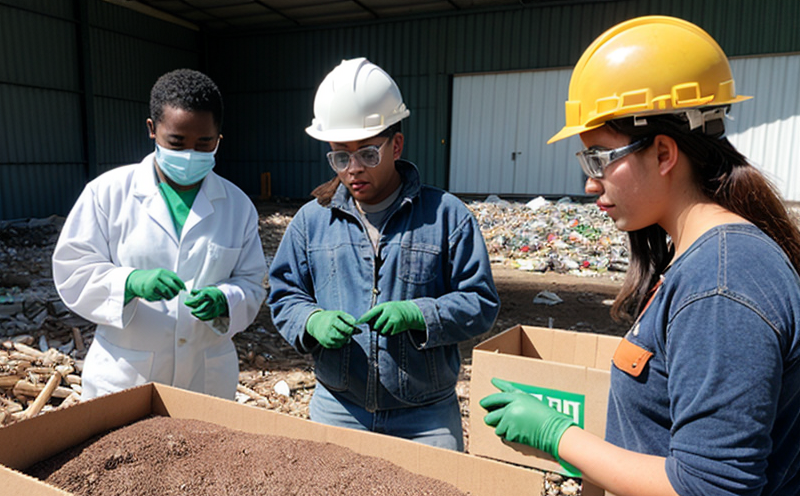ASTM D7611 Resin Identification and Recycling Classification
The ASTM D7611 standard provides a comprehensive approach to identifying polymers, specifically polyethylene (PE), polypropylene (PP), polystyrene (PS), and other common thermoplastics. This test is crucial for the toy manufacturing industry as it ensures that recycled materials are accurately identified before being incorporated into products. Accurate identification of these resins allows manufacturers to meet stringent regulatory requirements while also promoting sustainability through effective recycling practices.
The testing process involves several steps, including sample preparation and analysis using near-infrared spectroscopy (NIR). NIR spectra from samples are compared against a database containing reference spectra for various polymers. This comparison helps in determining the exact type of polymer present in the material. It is important to note that this method does not require destructive sampling; instead, it uses non-destructive techniques which make it suitable for testing recycled materials.
Understanding the composition of reclaimed plastics allows toy manufacturers to ensure they are meeting both internal quality standards and external regulatory requirements set by organizations like ASTM International. By accurately identifying these resins early in the development process, companies can better control their supply chains and reduce risks associated with using unknown or potentially non-compliant materials.
Accurate identification also facilitates traceability throughout production processes, helping to maintain consistency across batches of recycled content. For instance, knowing exactly what type of resin is being used ensures that any necessary additives or compatibilizers can be correctly specified during compounding stages. Additionally, accurate identification enables better forecasting of material properties which impacts design decisions regarding durability and safety.
Another key benefit of ASTM D7611 testing lies in its ability to support closed-loop recycling systems within the toy industry. By accurately identifying different types of plastic waste streams generated during manufacturing or end-of-life disposal, companies can more efficiently sort and process these materials into new products. This not only reduces environmental impact but also enhances resource efficiency by maximizing the value derived from post-consumer plastics.
It is worth noting that ASTM D7611 testing plays an integral role in fostering innovation within the toy sector by encouraging exploration of innovative approaches to incorporating recycled materials into designs without compromising quality or safety. As consumer demand for sustainable products grows, manufacturers who adopt such practices early on will be better positioned to meet evolving market expectations.
Furthermore, ASTM D7611 testing supports compliance with international regulations governing the use of recycled content in toys and other children's products. Many countries have established guidelines that require companies to ensure they are using properly identified and validated recycled materials in their products. Failure to adhere to these standards could result in product recalls or legal action against offending firms.
In summary, ASTM D7611 testing is a vital tool for ensuring the accuracy of resin identification when utilizing recycled materials in toy production processes. Its ability to provide precise information about the types and amounts of different polymer fractions present within reclaimed plastics makes it an indispensable asset for maintaining high standards of quality control while promoting sustainable practices.
Applied Standards
| Standard | Description |
|---|---|
| ASTM D7611-14(2019) | This standard specifies near-infrared spectroscopy (NIR) as the method for identifying and classifying polymers based on their infrared absorption characteristics. It covers polyethylene, polypropylene, polystyrene, and other common thermoplastics. |
Customer Impact and Satisfaction
By providing accurate identification of recycled materials used in toy manufacturing processes, ASTM D7611 testing supports customers in achieving their sustainability goals. This includes reducing waste sent to landfills by recycling more post-consumer plastics into new products.
Clients benefit from increased confidence that all components meet regulatory requirements set forth by various governing bodies around the world. This reduces potential risks associated with non-compliance or recalls due to substandard materials.
Additionally, accurate identification allows for more precise formulation of recycled content into end products such as toys. This leads to improved performance characteristics like colorfastness and flexibility which ultimately enhance customer satisfaction.
Our laboratory's commitment to delivering reliable results has earned us a reputation for excellence among our clients in the toy industry. We pride ourselves on providing timely, accurate reports that help our customers make informed decisions about their supply chain management strategies related to recycled material usage.
International Acceptance and Recognition
The ASTM D7611 standard is widely recognized across multiple regions for its reliability in identifying polymers using near-infrared spectroscopy. Its broad acceptance ensures consistent results regardless of location, making it an ideal choice for multinational corporations operating globally.
Many countries have adopted this standard as part of their national regulations regarding the use of recycled content in toys and other children's products. This global recognition enhances the credibility of ASTM D7611 testing among regulatory authorities worldwide.
Incorporating ASTM D7611 into your quality assurance program demonstrates a commitment to using best practices for material identification, thereby boosting your company’s image as a responsible and forward-thinking business partner within the industry.





